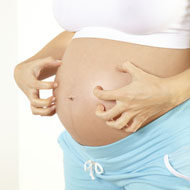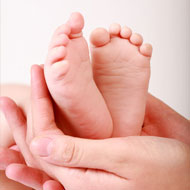- General Articles
- General Pregnancy Questions
- Baby Growth
- Pregnancy Diet
- Miscarriage
- During Pregnancy
- Twin Pregnancy
- Toddler Meals
- Home Remedies During Pregnancy
- Breastfeeding
- Pregnancy Week By Week
- Pregnancy Tests
- Ectopic Pregnancy
- Pregnancy Signs and Symptoms
- Pregnancy Stages
- Potty Training
- Fetal Development
- Preschooler
- Postpartum Depression
- Toddler Illness
- Baby Care
- After Pregnancy
- Molar Pregnancy
- During Delivery
- Beauty and Style
- Pregnancy Clothing
- Preconception
- Fertility
Eczema During Pregnancy: Causes, Signs & Treatment
Eczema can be described as achronic skin condition, characterized by the appearance of a rash. This inflammation can affect any part of your body, but is usually seen on the arms and around the knees. There are different types of eczema, the most common one being atopic dermatitis.
The correlation between eczema and pregnancy has still not been established. While some women gain respite from the condition when they get preg
nant, others develop eczema during pregnancy.In fact, data shows that 80% of the women suffering from this skin affliction experience it for the first time when they get pregnant.
Fortunately, eczema is not a serious problem, though it can lead to a lot of discomfort. It may be a relief to know that this condition is not contagious and in all probability won’t cause any harm to your unborn baby.
Nevertheless, you need to make sure that your doctor is aware of any rash, inflammation or flare ups that occur during pregnancy.
What causes eczema during pregnancy?
The exact causes of eczema are still not clear, but many skin experts claim that the condition occurs because of
- Heredity: In case you develop eczema, it is quite likely that the condition runs in your family. You could also be prone to this condition, if you have a family history of asthma or hay fever.
- Exposure to irritants: A common form of eczema,contact dermatitis, usually occurs when there is increased contact with common skin irritants like detergents, chemicals, yeast and certain metals.
- Poor immunity: People who have are suffering from compromised immunity, because of health problems, may develop a skin condition like eczema.
Most of the changes that take place within your body during pregnancy are caused by hormonal fluctuations. These hormonal changes could also be responsible for the onset of eczema during pregnancy. Many people believe that high levels of stress and emotional disorders can lead to eczema. While these issues may worsen the condition, they cannot cause it. Some of the other factors that could aggravate eczema during pregnancy include:
- Changes in the temperature or humidity levels
- Development of food or skin allergies
- Dry skin
- Hot baths or showers
- Increased perspiration
What are the signs of eczema during pregnancy?
The symptoms of this skin affliction depend on its severity. If you are suffering from mild eczema, you may experience nothing more than excessive skin dryness. However, if the problem is severe, your skin could become so raw and tender, it may bleed. You should consult your doctor immediately in case you happen to notice these symptoms:
- Appearance of gray or brown colored patches
- Itching, which usually worsens during the night
- Small, raised bumps that leak fluid when scratched and crust over
- Thickening, cracking or scaling of the skin in certain areas
At times, scratching because of eczema could lead to bleeding and bacterial infection. Therefore, if your skin ever feels so itchy or if you notice bleeding, speak with your doctor right away.
How can Eczema During Pregnancy be Treated?
The treatment of eczema is usually aimed at:
- Controlling the inflammation
- Reducing pain, discomfort and itching
- Preventing flareups
Under normal circumstances, doctors may prescribe over-the-counter medication or topical steroids for treating eczema. However, when you are pregnant, such options are off limits to you.
Fortunately, there are a few simple steps you can take to seek relief from the uncomfortable symptoms and prevent flare ups. A few strategies that may be useful are:
- Keep your skin moisturized at all times, to prevent excessive drying and cracking.
- Avoid any cosmetic or skincare products that irritate your skin, like perfumes, deodorants, soaps, toiletries and so on. At times pets, plants, foods or metals could also act as eczema triggers
- Use a cold compress instead of your fingernails every time you need to itch. Your nails can puncture your skin, through which bacteria can enter and cause an infection
- Wear clothes that are loose-fitting and comfortable and preferably made from cotton. Synthetic fabrics or woolen clothes may feel rough or could lead to overheating, which aggravates eczema
- Find ways that help you stay calm and stress-free during your pregnancy. This could mean getting adequate rest and sleep during the day, or even engaging in a hobby that helps your relax. If you plan to practice yoga, you need to speak to your doctor first.
- Make sure that your surroundings are cool and contain adequate humidity. You can do so by the fan, air-conditioner and a humidifier when indoors. Try not to venture out during peak hours. If you do not have an option, wear clothing and sun-screens that protect your skin from the heat and the glare of the sun.
While most of these steps are safe if followed correctly, please check with your doctor, before trying any of them. Never try to treat or control eczema during pregnancy on your own. Make sure that you inform your doctor about it, as soon as you notice any symptoms.
Read more articles from the During Pregnancy Category.



 7 Must-Haves Before Your Baby Arrives
7 Must-Haves Before Your Baby Arrives Bonding Games for Babies
Bonding Games for Babies DIY Baby Bath Towel Apron
DIY Baby Bath Towel Apron Common Late Pregnancy Fears
Common Late Pregnancy Fears